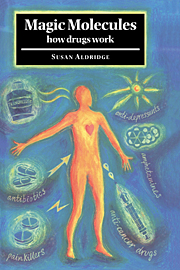Book contents
- Frontmatter
- Contents
- List of illustrations
- Acknowledgements
- Introduction
- 1 How drugs work
- 2 From penicillin to Prozac: introducing pharmaceutical drugs
- 3 Fighting infection
- 4 The hormonal revolution
- 5 Cardiovascular drugs: protecting the heart and brain
- 6 The problem of pain
- 7 The cancer challenge
- 8 Drugs for the mind
- 9 Drugs of recreation and addiction
- 10 Natural alternatives: vitamins, minerals and herbs
- 11 In the pipeline: gene-based medicine
- Bibliography
- Index
6 - The problem of pain
Published online by Cambridge University Press: 05 August 2012
- Frontmatter
- Contents
- List of illustrations
- Acknowledgements
- Introduction
- 1 How drugs work
- 2 From penicillin to Prozac: introducing pharmaceutical drugs
- 3 Fighting infection
- 4 The hormonal revolution
- 5 Cardiovascular drugs: protecting the heart and brain
- 6 The problem of pain
- 7 The cancer challenge
- 8 Drugs for the mind
- 9 Drugs of recreation and addiction
- 10 Natural alternatives: vitamins, minerals and herbs
- 11 In the pipeline: gene-based medicine
- Bibliography
- Index
Summary
The experience of pain is almost universal. There are perhaps 100 people in the world who have been born with a genetic defect which leaves them unable to feel pain. They have to learn to make their way through life without any natural protection from serious injury. For the rest of us pain is a sign that something is wrong. Painkillers, or analgesics, which are the most widely used of all drugs, may get rid of the pain, although they will not tackle the underlying cause. Thanks to drugs like aspirin and morphine, hardly anyone today need fear the misery of pain. But effective relief relies on matching the drug to the pain – which is sometimes a considerable challenge.
Understanding pain
Even the experts have difficulty in pinning down just what pain is. According to the International Association for the Study of Pain, it is an unpleasant sensory and emotional experience associated with actual or potential tissue damage. There are no blood tests, scans, or other laboratory measures which can diagnose pain. Where pain is a clinical problem, doctors rely on the patient describing their pain via a questionnaire. One of the most widely used tests, the McGill Pain Questionnaire, uses up to one hundred words – from ‘gnawing’ or ‘piercing’ to ‘pounding’ or ‘shooting’ – to try to capture the patient's experience.
The perception of pain goes far beyond its physical cause. It also depends upon cultural background, psychological experience, and the patient's current situation. Individual variations in pain experience have been assessed by measuring lower and upper pain thresholds under laboratory conditions.
- Type
- Chapter
- Information
- Magic MoleculesHow Drugs Work, pp. 143 - 158Publisher: Cambridge University PressPrint publication year: 1998



